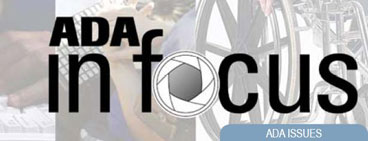Volume 26, Number 2

ADA in Focus is published three times yearly by the Mid-Atlantic ADA Center.
ADA in Focus is intended for use by individuals, state and local governments, businesses, legal entities, and others interested in developments in the Americans with Disabilities Act. This publication is intended solely as an informal guidance and should not be construed as legally binding. ADA in Focus does not serve as determination of the legal rights or responsibilities under the ADA for any individual, business or entity. Learn more about the Mid-Atlantic ADA Center.
In the Foreground
Director’s Message: Celebrate 32 Years of the ADA!
Focal Point
Accessible Medical Diagnostic Equipment:
A Critical Component of the Health Care Continuum
A wide variety of health care providers are covered by the ADA. State and local government agencies covered by Title II and private businesses covered by Title III include hospitals, clinics, medical and dental offices, labs, and imaging and other diagnostic facilities. These facilities provide screening and diagnostic tests and services designed to identify illnesses and chronic health conditions, or risks for health conditions, so that people can get appropriate treatment or learn about prevention measures.
When equipment used to perform these tests and examinations is inaccessible to individuals with mobility limitations, including those who use wheelchairs, scooters, walkers, or other assistive devices, prevention or treatment efforts can be delayed, often with serious and unnecessary consequences.
The U.S. Access Board, in consultation with the Food and Drug Administration, developed accessibility standards for medical diagnostic equipment (MDE). The standards, finalized in 2017, were developed under the Rehabilitation Act, which covers federal and federally funded programs and services. Federal executive agencies may adopt the MDE standards in order to promote and ensure access to the health care services they provide or support through funding.
The U.S. Department of Justice (DOJ) may adopt MDE standards under the ADA, but has not yet done so. Nevertheless, health care providers covered by the ADA are subject to the obligation to ensure people with disabilities have equitable opportunities to receive and benefit from services. The DOJ has entered several settlement agreements with health care providers to address lack of accessible MDE or appropriate alternatives, such as providing assistance to individuals with mobility disabilities who are unable to independently transfer or get onto an inaccessible examination table.
The Access Board’s MDE standards cover examination tables and chairs (including chairs used for dental or eye examinations), weight scales, mammography equipment, x-ray machines, and other radiological equipment used for diagnostic purposes. Some of these types of equipment, such as examination tables and chairs, are also used for treatment procedures, so increasing access to these elements may expand both diagnostic and treatment options, and may improve effectiveness, safety, and comfort for both providers and patients.
Check out our archived article “From Family Physician to ICU: Access to Health Care is Critical.”
Resources
U.S. Access Board: Medical Diagnostic Equipment Accessibility Standards
U.S. Department of Justice: Access to Medical Care for Individuals with Mobility Disabilities
ADA National Network fact sheets:
Zoom in on Training
ADAcon 2022: Early Bird Registration Ends August 8!
October 12 – 13, 2022
Alexandria, Virginia
Our annual conference, hosted this year in partnership with the Great Plains ADA Center, is a comprehensive conference on the ADA featuring more than 30 breakout sessions and panel discussions. This year’s conference includes sessions on disability inclusion in employment, state and local government programs, corrections and law enforcement, and parks and recreation. Register by August 8 and save $50!
A separate pre-conference event, to be held at The St. James Sports, Wellness, and Entertainment Complex on October 11, will feature tours, demonstrations, and opportunities to participate in inclusive recreational activities. Find your fun!
Zoom in on Court Decisions and Settlement Agreements
DOJ and Uber Enter Settlement Agreement to Resolve Allegations Related to Wait Time Fees
Uber Technologies, Inc. agreed to make changes to its wait time policy and pay compensation to more than 65,000 Uber users with disabilities who were charged fees because they needed more than two minutes to board Uber vehicles.
While Uber continues to deny that it is subject to the provisions of the ADA that govern transportation businesses, it agreed to implement changes to the wait time policy. Wait time fees will be waived for all Uber riders who certify that they (or someone they frequently travel with) needs more time to get in an Uber car because of a disability.
Additionally, Uber will credit the accounts of more than 65,000 eligible riders for double the amount of wait time fees they were ever charged, and pay compensation to other individuals affected by the wait time policy. The amount of compensation is expected to exceed $2 million at the least. The company will also pay a $50,000 civil penalty to the United States.
Uber will train its staff and implement a number of procedures to manage the wait time fee waiver program and distribute compensation funds.
For more details, read the Department’s press release: “Uber Commits to Changes and Pays Millions to Resolve Justice Department Lawsuit for Overcharging People with Disabilities,” the full settlement agreement, and the original lawsuit filed in the U.S. District Court in the Northern District of California.